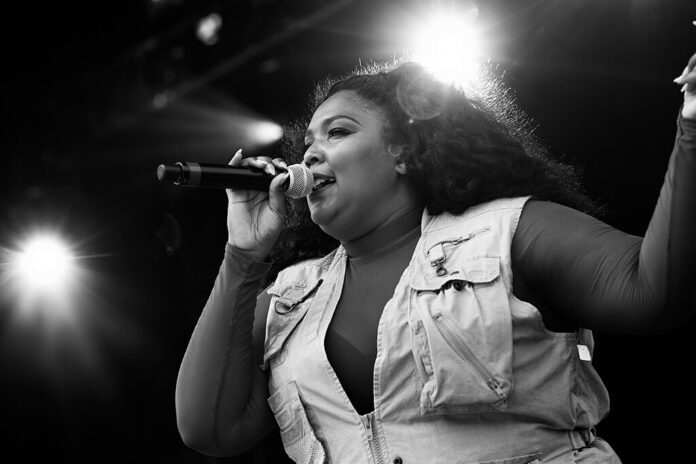South Park’s obesity-themed episode features Lizzo as a weight-loss alternative, sparking her amused reaction on social media
Lizzo expressed a mix of shock and excitement after “South Park” mentioned her in its recent obesity-themed special. The rapper and singer reacted to the scene in a TikTok video, where she joked about her “worst fear” being actualized: being named in a “South Park” episode.
In “South Park: The End of Obesity,” which premiered on Paramount+, Cartman embarks on a quest for weight-loss medication. When he learns about anti-obesity drugs and discovers he cannot afford them, his doctor prescribes him a cheaper alternative called “Lizzo.” This medication, humorously presented as an album, aims to make users “feel good about [their] weight.”
Embed from Getty ImagesA commercial within the episode features an upbeat voice promoting “Lizzo” as a drug that allows users to “eat everything you want and keep physical activity to a minimum.” It claims that 70% of users “no longer cared how much they weighed.” Lizzo filmed herself watching this scene, wide-eyed and with a hand over her mouth, reacting to the voice-over’s claims and the humorous side effects listed, such as constipation and “literally [excreting] out your ears.”
Lizzo commented on the video, saying, “That’s crazy. I just feel like, damn, I’m really that b—-.” She added, “I really show the world how to love yourself and not give a f— to the point where these men in Colorado know who the f— I am and put it on their cartoon that’s been around for 25 years.”
The episode aired amidst a rising trend of celebrities and influencers discussing their use of drugs like Ozempic and Wegovy for quick weight loss. Lizzo, whose real name is Melissa Jefferson, is known for promoting body positivity through her music and social media presence. In the episode, Cartman’s doctor described her as “a really good singer who talks about body positivity and just being happy with the way you look.”
Cartman initially reacts negatively to his prescription, which involves listening to Lizzo five times a day and watching her videos nightly. He complains, “Rich people get Ozempic. Poor people get body positivity.” However, by the episode’s end, after an absurd adventure to secure weight-loss drugs, Cartman and his friends change their perspective.
Kyle, in a cafeteria monologue, admits he was “wrong” for believing that “fat people just needed more willpower.” He criticizes sugar, pharmaceutical companies, and insurers for their manipulative practices, stating, “How can anybody have willpower when all these forces are manipulating us every day? It’s impossible. And I’ve learned one very important thing. It isn’t fair to put the blame on anyone for their weight.” He concludes by telling Cartman, “We’re not going to be critical of anyone over their weight ever again.”
The episode aired less than a year after three of Lizzo’s former dancers filed a lawsuit against her, alleging sexual harassment and a hostile work environment, including claims of weight-shaming. Lizzo has denied these allegations.
Analysis:
The recent “South Park” episode featuring Lizzo underscores the ongoing societal debate around body image, obesity, and weight-loss solutions. The show’s satirical take highlights various perspectives on these issues, contributing to broader discussions about body positivity and the influence of media.
From a political standpoint, the episode critiques the disparities in healthcare access, especially regarding weight-loss drugs. It emphasizes how economic inequalities affect people’s ability to obtain treatments, a point highlighted by Cartman’s complaint about the cost of anti-obesity medications.
Economically, the episode points out the lucrative nature of the weight-loss industry. It criticizes pharmaceutical companies and insurers for prioritizing profits over public health, which resonates with current debates about healthcare reform and the affordability of medications.
Sociologically, the episode and Lizzo’s reaction highlight the cultural shift towards body positivity. Lizzo, a prominent advocate for self-acceptance, embodies this movement. Her inclusion in the episode reflects her significant influence on contemporary discussions about body image and self-worth.
From a gender and race perspective, Lizzo’s presence in the episode is notable. As a Black woman who champions body positivity, her representation in mainstream media challenges traditional beauty standards and promotes diversity. The episode’s humorous yet critical take on weight-loss solutions aligns with Lizzo’s message of self-love and acceptance.
Media and communication theories also play a role in understanding the episode’s impact. “South Park,” known for its satirical and often controversial content, uses humor to address serious issues. By featuring Lizzo, the show taps into her cultural relevance and the broader discourse on obesity and body image.
In conclusion, “South Park’s” obesity-themed episode featuring Lizzo sheds light on the multifaceted issues surrounding body image, healthcare access, and societal attitudes towards weight. Lizzo’s reaction further amplifies these discussions, highlighting the ongoing importance of body positivity and self-acceptance in the cultural zeitgeist.
